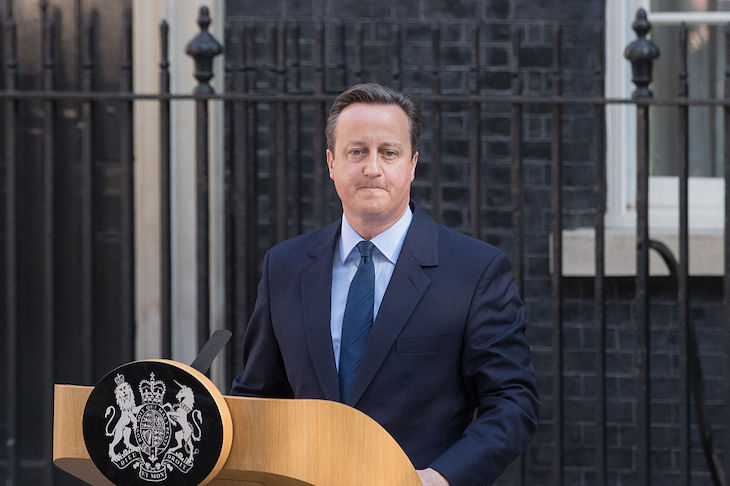One of the downsides of all this snarking at David Cameron over Brexit is that the rest of his legacy is getting away relatively snark-free. Fraser Nelson has resumed his valiant campaign to repackage the Cameron years as a well-spring of progressive Toryism, specifically in job creation, the expansion of academies, and shifting the tax burden. This effort has always struck me as iffy. For one thing, shouldn’t conservatives want the credit for economic dynamism, school choice and tax cuts to go to conservatism, rather than concede them as ‘progressive’ outcomes which conservatives have achieved in spite of their unfortunate philosophy?
But Fraser isn’t really a conservative. He’s a democratic optimist, the kind of liberal Margaret Thatcher would have become if she hadn’t got herself mixed up in all that unfortunate Tory business. The problem is that Cameron’s achievements are those of a moderate Conservative, and may be admired by a liberal, but they were a misery for the very poor, the disabled and the vulnerable.
Here’s what the Cameron years meant for them:
The ‘jobs miracle’ wasn’t all that miraculous. The number of people working on zero-hours contracts rose by 439 per cent, from 168,000 in the final quarter of 2010 to 905,000 by the close of business in 2016.
More living in poverty. Across Cameron’s two ministries the number of people on a relative low income rose by six per cent (before housing costs) or by nine per cent (after housing costs), while the population grew by 4.5 per cent. This means 600,000 additional people living on less than 60 per cent of the national median income before paying accommodation costs but 1.3 million afterwards.
After progress under New Labour, child poverty rose. There were an additional 400,000 children living in relative poverty before housing costs and 500,000 after, for a period in which the child population increased by 500,000. The lasting effects of six years of Cameronism are captured by the IFS’s conclusion that ‘relative child poverty is projected to rise from 17.8 per cent in 2015–16 to 25.7 per cent in 2020–21, undoing most of the falls since 1997–98’.
Food bank dependency soared. The Trussell Trust, which only runs half the UK’s food banks, provided 41,000 food parcels in 2009/10 but by 2016/17 this had risen to 1.2 million, turning 20,000 food bank users into almost 600,000 in less than a decade.
Universal credit (UC) punished the poor. According to the IFS, those in the lowest-income ten per cent of the population suffer the most and, by UC’s final roll-out in 2024, 4.6 million claimants will be at least £100 a year worse off, compared to 4.2 million who will benefit by the same amount. At the extremes, while 1.6 million will gain more than £1,000 a year, 1.9 million will lose out by the same amount. Using the Resolution Foundation’s analysis, 1.1 million two-parent households lose out by a mean of £53 a week while 700,000 single-parent families take a weekly hit of £57.
The benefit cap hit single-parent families hardest. Between its introduction in 2013 to 2016, the benefit cap was applied to 84,000 households, 94 per cent with children and two-thirds with one parent. By the end of Cameron’s premiership, almost 10,000 families were capped at £50 or less per week, while more than 3,000 households were docked between £100 and £150.
Jobseekers faced punitive sanctions with limited evidence that these punishments worked. Between 2011 and 2016, more than 800,000 Jobseekers Allowance (JSA) claimants were sanctioned through the Work Programme while fewer than 500,000 ‘job outcomes’ were achieved. One in four JSA claimants was sanctioned in the first five years of Cameron’s government, with the lowest-level penalty for a first-time sanction (handed down for things like missing an interview) levied at £300, or four weeks of benefits. A 2016 report by the National Audit Office concluded that sanctions had ‘mixed impacts’, prompting some claimants to take (lower-paying) jobs but others to drop out of both the welfare system and the labour market.
Disabled people lost their jobs then were sanctioned for being out of work. Since 2010, more than 900,000 disabled JSA claimants and more than 110,000 in receipt of Employment and Support Allowance through the Work-Related Activity Group have had their benefits sanctioned. In 2012, Cameron’s government cut off subsidies to Remploy, which provided work for disabled people, closing two-thirds of its factories and making 1,500 disabled people unemployed.
Mean streets. At the end of Cameron’s six years, the number of homeless people had increased by almost 17,000, after having dropped by 85,000 over the previous six years. Meanwhile, rough sleeping leapt by 134 per cent.
As a result of the coalition’s changes to tax, tax credits and welfare, the bottom twentieth on the income distribution saw their income fall on average by three per cent, while the income points from second to sixth-from-bottom lost two per cent. At the same time, nine of the top ten income points saw their pocketbooks fatten. Far from a champion of the poor, Cameron was Robin Hood in reverse.
All in all, it doesn’t sound terribly progressive, does it?







Comments